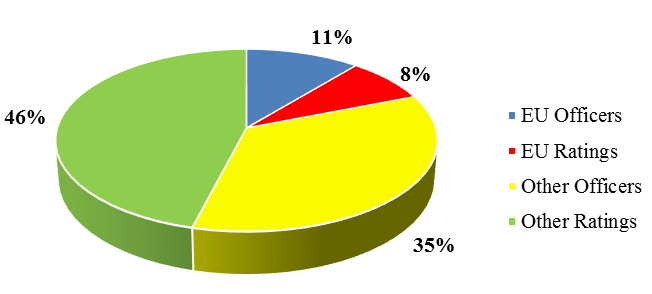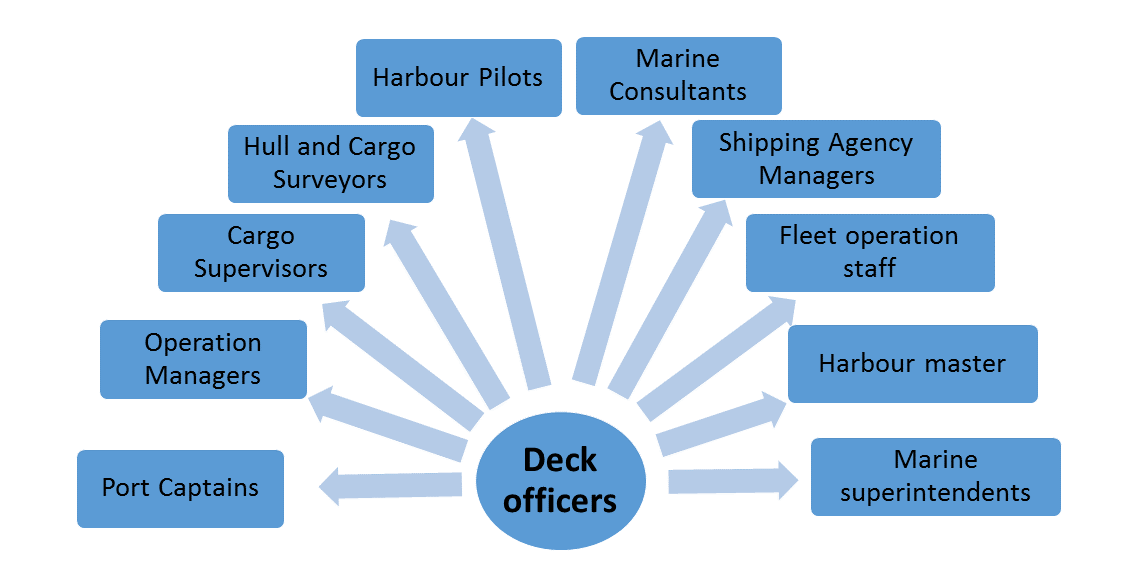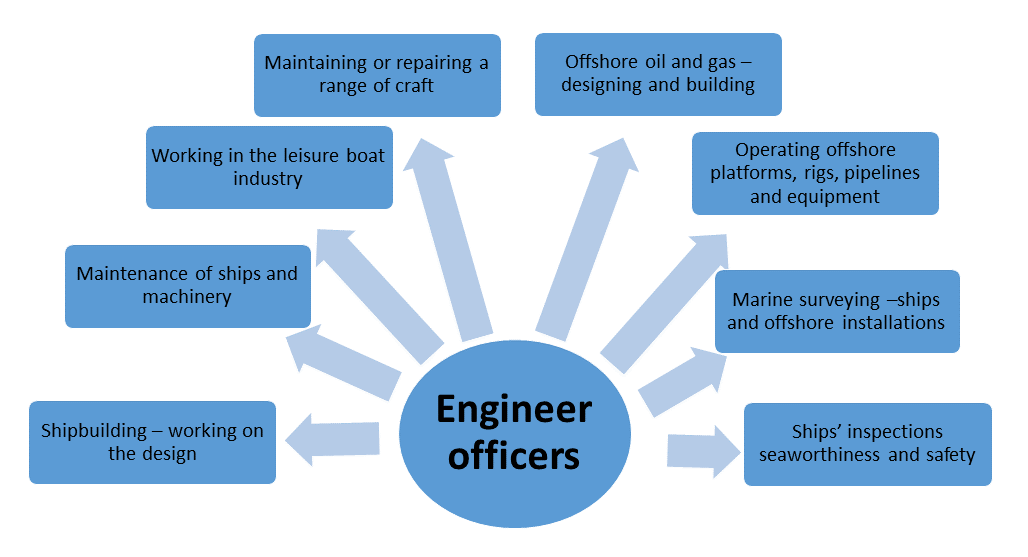Abstract
Romania’s admission following the extension of the EU and the globalisation of the maritime industry exposed Romanian employees to the maritime labour market. This market is characterised by increased competition determined by technological advancement and the emerging new Asian maritime nations. These conditions were exacerbated by the increased wage expectations of the European maritime manpower. On the demand side, the maritime industry has historically been characterised by lack of marine officers, in particular of senior rank, but the current slow global economic recovery and the weak commodity demand tend to level the scorecard. These changes affected the marine global labour market and led to structural unemployment among Romanian seafarers. Considering the traditional purpose of marine universities – to prepare marine officers, and the labour market needs – marine officers highly qualified in specific fields, this paper aims at identifying the skills required by marine industry and analysing the possibility to extend them to other positions/qualifications from the marine industry.
Keywords: Marine qualificationsemployability pathsmarine labour marketseafarers
Introduction
The labour market depends on competent and well-trained employees. The marine sector with its
international component is regulated by a global maritime system to ensure safety of life at sea,
protection of marine environment and efficiency of navigation. The four pillars that foster achieving
the above mentioned are:
1. The International Convention for the Safety of Life at Sea (SOLAS),
2. The International Convention for the Prevention of Pollution from Ships,
3. The Maritime Labour Convention (MLC), of the International Labour Organization and
4. The International Convention on Training, Certification and Watchkeeping for Seafarers and its
associated Code (STCW).
The STCW Convention from 1978, amended in 1995 and again in 2010 with Manila amendments,
set the standards for maintaining a safe shipping environment. This Convention specifies the standards
of professional competencies of the seafarers as well as establishes provisions for ship-owners, national
maritime administrations and training establishments (International Maritime Organization, 2010).
International concern
During the maritime skills roundtable discussions organised by the international professional body
and learned society for all marine professionals, IMarEST and the specialist global recruitment
company MatchTech (IMarEST, 2013) for the purpose of “Mitigating the skills gap in the maritime
and offshore oil and gas market”, the participants discussed “any competences that you [sic] feel
graduates are lacking”. The results showed that 71% of respondents considered that graduates were not
leaving university with all the expected competences. These were evenly distributed between lack of
industry experience and soft skills. The labour market noticed the needs of skills improvement and
recommended to “formulate a transfer of skills programme to attract engineers from other industries”.
According to the “Rethinking Education” initiative (European Commission, 2012), aiming at
building “skills for the 21st century”, efforts are needed to develop soft skills to enhance employability.
This has to be achieved through continuous professional development of trainers and exchanging good
practices applicable to improve and assess the trainees’ soft skills. The seafarers’ lack of soft skills is
largely determined by the extended periods of job seeking alternating with short term employment
contracts, often ranging from 3 to 4 months.
The European Commission Progress report towards Lisbon Objectives in Education and Training
(Country Report on National Provisions for a Lifelong Learning Strategy Romania, 2008) sets out that
there are huge gaps regarding the adults’ participation to lifelong education and training in EU:
Scandinavian countries and Great Britain have the highest participation rates, over 20%, while in
Bulgaria, Greece and Romania this is only 2%. Given these circumstances and the Country Specific
Recommendations formulated by the EC 2014 for the EU member States (European Commission,
2014), the Romanian Government (2015) has included a directive for the education development in the
National Reform Programme. This directive addresses CSR 5, aimed at increasing the quality of, and
access to, vocational education and training, apprenticeships, tertiary education and lifelong learning,
and adapting these to labour market needs.
Marine officers’ skill set
According to the most comprehensive report elaborated by the International Shipping Federation
(ISF) and the Baltic and International Maritime Council (BIMCO) in 2010, “Manpower up-date study”,
the estimated number of supply of seafarers in 2010 based on the number holding STCW certificates, is
summarized in the Table
Based on the above statistics, the total worldwide workforce is shared between EU plus Norway,
and seafarers of the rest of the world as illustrated in figure

Due to the decline in the seafarers demand, the tables below present the skills and competencies that
marine professionals have to continuously improve for increasing the employability opportunities.
These comprise several categories of skills: professional competencies, work competencies and
transversal skills.
Professional competencies
The assessment of the professional skills of marine officers, as well as on bridge management and
attitudes, could be carried out through combined observations, assessments and training focused on
(Schager,1997): •ability to manage the bridge/engine operation, to follow up and to monitor the work and capacity to stay in control;
have on the bridge/engine room.
Skills and work competencies
•monitoring various routines and being able to see that the checklists and other written or verbal
instructions are correct and complied with;
areas; •competitor/industry awareness and consideration of these factors in planning, decision-making, etc.; •taking initiative and responsibility, e.g., decision-making, project management, running meetings;
•appreciating / applying social responsibilities, sustainability, humanity and ethical
considerations.
Transversal skills
The transversal skills refer to personal behaviours and attitudes gained through formal, non-formal
and informal learning (CIMA, 2009):
Transferring skills for diversification of career paths
The Task Force on Maritime Employment and Competitiveness (TFMEC) has analysed the
maritime regulations framework and formulated several recommendations related to seafarers’
competencies intended to diversify the employability paths. The components identified by the TFMEC
as necessary for retaining and maintaining maritime employment are (TFMEC, 2011): •access to initial training programmes leading to qualifications that are recognised as ensuring the competences needed; •availability of opportunities for acquiring practical experience at sea as part of or immediately following initial training programmes;
including ratings, to improve their initial skills and qualifications giving them the possibility to
advance in their careers; •existence of prospective jobs on land after they have been at sea for several years, in various marine economy sectors.
On average, the world trade growth in marine employment was on the range of 6% per year in the period 1988 – 2008 (BIMCO, 2015). The world trade declined in 2009, on average 5.2% per year and in 2014 to 3.1%. This conducted to thorough marine labour market prospects to find job opportunities for deck officer. The marine training establishments through their career advisors provide guidance for the qualified officers such as:


The seafarers’ skill sets and competencies required for positions on board were included in a
performance assessment chart, Table
and expertise meets the expected level of performance according to the desired position.
Discussions
Considering the seafarers’ qualifications and their subsequent competencies, together with the
identified opportunities for career progress emphasised in figure nos. 2 and 3, the authors proposed
placing the marine jobs in performance assessment charts. The chart presented in Table
elaborated as an instrument for performance level self-assessment, allowing marine professionals to be
acquainted of the following steps for a successful career in the marine sector. The proposed instrument
is expected to impact the marine engineers’ careers, offering directions for upskilling the professional
and transversal abilities. The improved abilities will increases the chances of diversification of careers
pathways for accessing different jobs in the blue economy.
Conclusions
The diversification of the marine sector, extending from well-known seagoing ships to offshore
platforms, vessel inspection, quality control, marine environment protection or marine casualty
investigations, requires targeted policies such as job retraining and acquiring of transversal skills.
Including the above mentioned skills in a performance assessment chart provides a profile design
instrument for seafarers. The profile allows recognition of the level of competencies and estimation of
the areas of improvement to enhance diversification of career paths.
References
- International Maritime Organization (2010). International Convention on Standards of Training, Certification and Watchkeeping for Seafarers, 1978/1995/2010.
- Institute of Marine Engineering, Science & Technology (IMarEST), (2013). Mitigating the skills gap in the maritime and offshore market, Maritime Skills Roundtable Discussions.
- European Commission (2012). Communication from the Commission to the European Parliament, the Council, the European economic and social Committee and the Committee of the regions. Rethinking Education: Investing in skills for better socio-economic outcomes. Strasbourg Country report on national provisions for a lifelong learning strategy Romania (2008). Identification of critical success factors for implementing NLLS, through collaboration and exchange of expertise.
- European Commission (2014). Country Specific Recommendations for the EU member States Romanian Government (2015). National Reform Programme. Romania: Bucharest.
- The Baltic and International Maritime Council (BIMCO), (2010). The BIMCO/ISF Manpower 2010 Update. The Worldwide Demand for and Supply of Seafarers.
- Schager, B (1997). Counteracting the human factor by means of focused selection, on-board bridge training and challenging of ingrained attitudes. Marine Profile.
- Chartered Institute of Management Accountants (CIMA), (2009). Career management: how to assess your skills. Task Force on Maritime Employment and Competitiveness (TFMEC), (2011). Report of the Task Force on Maritime Employment and Competitiveness and Policy Recommendations to the European Commission. The Baltic and International Maritime Council (BIMCO), (2015). The Manpower Report.
- Safety4Sea (2014). Crew Competence Assurance Management: New Initiatives.
Copyright information

This work is licensed under a Creative Commons Attribution-NonCommercial-NoDerivatives 4.0 International License.
About this article
Publication Date
04 October 2016
Article Doi
eBook ISBN
978-1-80296-014-3
Publisher
Future Academy
Volume
15
Print ISBN (optional)
-
Edition Number
1st Edition
Pages
1-1115
Subjects
Communication, communication studies, social interaction, moral purpose of education, social purpose of education
Cite this article as:
Acomia, ., & Ovidiub, A. (2016). Diversification of Seafarers’ Employability Paths. In A. Sandu, T. Ciulei, & A. Frunza (Eds.), Logos Universality Mentality Education Novelty, vol 15. European Proceedings of Social and Behavioural Sciences (pp. 21-27). Future Academy. https://doi.org/10.15405/epsbs.2016.09.4

